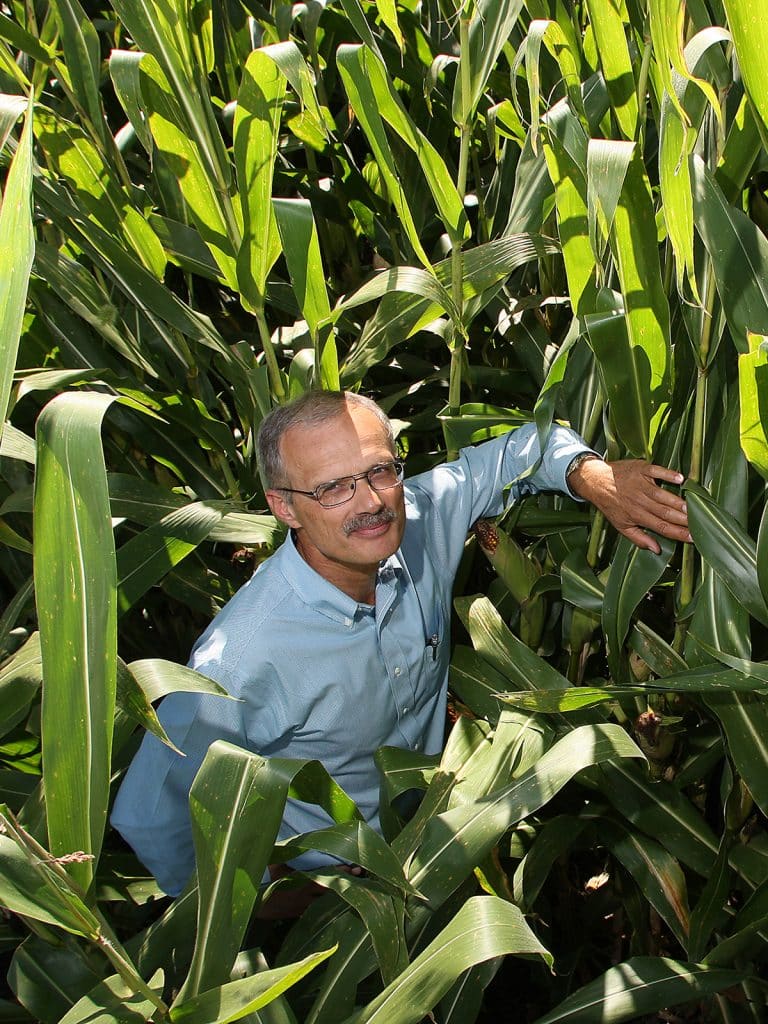Crops: Corn for grain
4R Practices: Rate Time
Relationships of Nitrous Oxide Emissions to Fertilizer Nitrogen Recovery Efficiencies in Rain-fed Corn Systems: Research Foundation Building

Lead Researcher:
Dr. Tony Vyn
Department of Agronomy, Henry A. Wallace Chair in Crop Sciences
Purdue University
Start Date: 2014
End Date: 2015
Collaborating scientists and universities
- Dr. Rex Omonode, Purdue University
Matching Funds
- USDA – National Institute of Food and Agriculture
Project Summary
Despite many years of research on nitrous oxide (N2O) emission from corn experiments with various N management treatments applied, little is known about the relationships between N2O loss and plant nitrogen recovery efficiency (NRE). Our review publication (Omonode et al., 2017) provided a summary of the known relationships with existing North American data, but in most cases N2O and NRE data are seldom collected and/or reported from the same experiments. Thus, although it is commonly assumed that higher NRE following environmentally-beneficial N fertilizer management practices will lead to lower N2O emissions, too little evidence exists for this assumption across the range of corn/N management tracks. The overall aim of this project was to provide more concrete field research data to either support or reject this hypothesis. Our specific objective was to determine the relationships between seasonal N2O emissions, whole plant nitrogen (N) uptake, and NRE in rainfed corn under different tillage and nitrogen (N) fertilizer management systems.
Project Goals:
- Analyze corn stover and grain N concentrations from whole-plant biomass samples taken at the R6 stage in ongoing Indiana studies involving N source (UAN and NH3 with and without nitrification inhibitors), N rate (from a 0 N control to as much as 240 pounds N/acre), and tillage system interactions with N losses.
- Expand the N timing research already underway in Purdue’s 4R Nutrient Stewardship research (2015-2017) to include intensive sampling of both growing-season N2O emissions as well as whole-plant N uptake at maturity in our late-season supplemental N experiments (where pre-plant or standard sidedress of 75-80% of the intended N rate is followed by a late-stage V12-V14 sidedress application of the remaining 20-25% of total N).
Project Results:
- A data review found relationships between nitrogen efficiency terms and nitrous oxide emissions would be more discernable if published studies measured total nitrogen uptake in aboveground biomass and reported nitrogen recovery efficiency data.
- The timing of nitrogen application affected the relationship between nitrogen recovery efficiency and nitrous oxide emissions, with a stronger relationship in treatments with side-dressed nitrogen applied at corn growth stages V6-8 and V14.
- Nitrogen uptake is a better indicator of nitrous oxide emissions for systems applying nitrogen pre-plant.
Annual Reports

2015

2016

2018
Publications
- Omonode, R. A., & Vyn, T. J. (2019). Tillage and Nitrogen Source Impacts on Relationships between Nitrous Oxide Emission and Nitrogen Recovery Efficiency in Corn. Journal of Environmental Quality, 48(2), 421–429. Read More
- Omonode, R. A., Halvorson, A. D., Gagnon, B., & Vyn, T. J. (2017). Achieving lower nitrogen balance and higher nitrogen recovery efficiency reduces nitrous oxide emissions in North America’s maize cropping systems. Frontiers in Plant Science, 8(June), 1–16. Read More
- Omonode Rex A., and Tony J. Vyn. 2016. Effects of ecological intensification and late-split N timing on the relationship between nitrous oxide emission and nitrogen recovery efficiency in corn. Abstract 47-19; ASA-SSSA-CSSA International Annual Meeting, Phoenix, AZ. Nov 6-9, 2016. Read More
- Omonode, Rex A., and Tony J. Vyn. 2015. Integrated nitrogen rate and nitrification inhibitor application effects on nitrogen use efficiency and nitrous oxide emission in rainfed corn. Abstract 183-3; ASA-SSSA-CSSA International Annual Meeting, Minneapolis, MN. Nov 15-19, 2015. Read More
- Omonode, Rex A., Douglas Smith, and Tony J. Vyn. 2015. Trace gas fluxes, global warming potential and greenhouse gas intensity related to tillage and nitrogen application with and without nitrapyrin in rainfed corn. Abstract 79-1; ASA-SSSA-CSSA International Annual Meeting, Minneapolis, MN. Nov 15-19, 2015. Read More
- Omonode, R.A., Cliff Johnston, and Tony J. Vyn. 2014. Nitrification kinetics and nitrous oxide emissions in long-term tillage systems following co-application of urea-ammonium-nitrate and Nitrapyrin. ASA Abstract # 257-6: ASA, CSSA, SSSA Annual Meetings. Long Beach, CA. Nov. 2- 5 2014. Read More